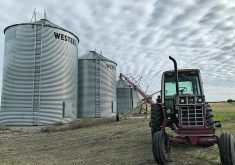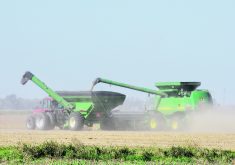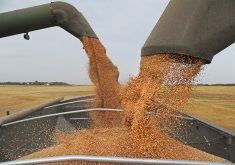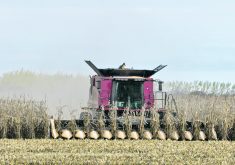MANITOBA
Winter wheat harvest is complete with yields ranging from 50 to 100 bushels and the average at 65 to 60 bu. Spring wheat harvest continues, with yields from 30 to 70 bu. Barley is running 40 to 100 bu., oats 45 to 100 bu., canola 15 to 40 bu. and peas 35 to 45 bu. per acre.
Southwest
Rain temporarily slowed the harvest.
Fall rye is averaging 50 to 70 bu.
Heat stress, moisture stress and disease have lowered test weights, yield and quality of many crops.
Pastures were grazed early this year, which may affect carrying capacity this fall. Dugouts are 70 percent full.
Read Also

VIDEO: Agritechnica Day 4: Robots and more robots, Nexat loves Canada and the trouble with tariffs
Agritechnica Day 4: Robots and more robots, Nexat loves Canada and the trouble with tariffs.
Northwest
Warm days and cool nights created mainly favourable conditions early in the harvest, but rain then caused delays in many localized areas.
Most cereals are grading No.2 but with little fusarium, wheat midge or ergot. Canola expectations continue to decline because of aster yellows and sclerotinia.
Greenfeed and native hay yields are average, except where moisture keeps equipment out of the fields. The second cut forage harvest is complete.
Central
High dockage is reported in canola because of small seed size.
Preharvest desiccation of edible beans is nearly complete. Early maturing beans such as light red kidney are being undercut. Drybean harvest has started.
Soybeans are in the R7 growth stage.
Pumping continues as livestock producers try to replenish dugouts. Pastures that were grazed early are showing signs of stress.
East
Varying amounts of rainfall have slowed some harvest operations.
The red spring wheat harvest is complete, with yields in the 50 bu. range. Barley is running 55 to 60 bu. and oats are running 80 bu., although there are light bushel weights. Flax harvest has started. Sunflowers are moving into the R7 stage. Soybeans are pod filling. Corn is in the milk or dough stage.
Hay is only 50 percent adequate, greenfeed is 70 percent adequate and feed grain 25 to 80 percent adequate.
Interlake
Wet conditions continue to keep equipment out of the fields starting at Winnipeg Beach, running to Riverton and across to Gymsumville. The spring wheat crop is in, with yields from 40 to 50 bu. per acre. Oat yields are 45 to 130 bu., but shattering is a problem.
Saskatchewan
Producers have combined 11 percent of the crop, with 18 percent swathed or ready to straight combine. This is ahead of the five-year average for this time of year.
Producers have combined 79 percent of winter wheat, 78 percent of fall rye, four percent of spring wheat, seven percent of durum, six percent of barley, five percent of canola, 22 percent of mustard, 36 percent of lentils and 41 percent of field peas.
South
Warm weather combined with little precipitation has benefited growers, who have harvested more than a quarter of the crop.
Average yields vary, with reports that variable crop staging, disease and heat stress damage are making yield assessments difficult in the southeast.
Crop yield estimates have been decreasing in recent weeks with reports from producers that yields are below expectations.
In the southwest, there have been reports of grasshoppers damaging crops and large flea beetle populations in canola. Some areas received a light frost, but damage appears minimal.
Central
Harvest remains in the early stages because work was delayed due to varying amounts of rain. The North Battleford area received as much as 20 millimetres.
Warm and dry weather is needed to assist later-seeded crops in west-central Saskatchewan, where crop reporters indicate yield assessments are difficult and many combined pea crops are showing disappointing yields.
In the east, cereal yields are expected to be lower because of lodging, aster yellows and sawfly damage.
With reports of shrunken kernels and ergot, there could be quality issues. A light frost in the area caused minimal damage.
North
Northern Saskatchewan received significant amounts of rain, delaying field operations that are just beginning.
Spraying continues for bertha armyworms, diamondback moths and lygus bugs in some areas. There are reports of wheat midge larvae in wheat heads in the northwest, but damage appears minimal. As well, farmers have noticed wildlife and disease damage in pea fields and significant losses from aster yellows in canola.
With warm weather producers will get a second cut of hay.
ALBERTA
PEACE
Swathing of canola is mostly complete, but yields are expected to be disappointing on most fields. Heat during flowering and little rain throughout the summer knocked back yields, but little harvest has begun across the region.
Combines have started near Dawson Creek, B.C., with yields disappointing in wheat and canola. Spotty showers are slowing harvest. It will be a couple weeks before harvest is well under way.
Pea crops have been the first to be harvested with about half the acres combined.
About 10 percent of winter cereals have been harvested with moderately good yields. Some reseeding of winter wheat has begun. Farmers are spraying for bertha armyworms in some fields.
Almost all of the haying has been completed with good yields. Periodic rains have kept pastures growing.
NORTHWEST
Rain and hail slowed harvest in areas.
More than half the peas have been harvested in the region with good yields. Some winter cereals have been harvested and some early barley. Silage is well underway.
A stretch of good weather has allowed a second cut of hay. Many acres of hay have turned black after continual showers.
Most of the canola has been swathed and farmers are hoping for better than average yields.
Hail and insects have been a problem in some areas.
NORTHEAST
Harvest is just getting underway. Rain and continual showers kept many farmers out of the field. Rain and hail have dashed hopes of high yields. Farmers have finished spraying for bertha armyworms. There are some reports of the worms moving into corn fields.
Silage is well underway. Haying has resumed after wet weather turned many acres of previously cut hay black.
Harvest of peas is well underway with farmers reporting good yields. Hail damaged thousands of acres of crop near Viking.
CENTRAL
Good yields reported for peas and some early wheat. Overall yields are expected to be very good.
There are reports of yellow asters- infected canola not drying down at the same time as the rest of the crop.
The wheat and barley harvest has begun.
Rain and hail slowed harvest in some areas. Recent hail has wiped out some farmers. Fields were white with hail, but hail and severe thunder showers were not widespread.
The second cut of hay is almost complete.
SOUTH
The pea and barley harvest is almost complete. Canola harvest is well underway, but there are reports of disappointing yields. Canola isn’t yielding as expected.
Hail and insects have taken their toll on some fields. Overall, yields are expected to be close to historic levels.














